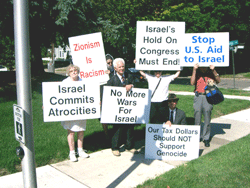
Growing up in what he described as a “conservative Jewish home,” Henry Herskovitz was oblivious to the happenings in Palestine.
But a conversation with a stranger in 1985 on the holiday of Yom Kippur wound up as a life-changer for the current social activist.
“I remember him telling me that Israel had the fourth-largest military in the world and I didn’t believe him so I just had to go home and look it up,” he said.
Herskovitz confirmed that comment to be true and continued to research more about the conflict.
Now, the 62-year old actvist has made it his life’s mission to fight for Palestine and to get local Jewish leaders to open dialogues with his group, Jewish Witnesses for Peace and Friends. He retired from his job as an engineer and now is focusing almost exclusively on this fight.
Every Saturday, the group stages peaceful, silent demonstrations in front of Beth Israel Congregation in Ann Arbor, a Jewish synagogue. Holding signs protesting U.S. aid to Israel and calling for an end to Jewish occupation of Palestinian land, around ten people out of the group’s listed 22 members demonstrate from 9:30 to 10:45 a.m. as congregation members trickle in. Members rotate each week for the vigils.
Herskovitz talked about why he chose Beth Israel as the site for his demonstrations.
“They call themselves the house of Israel, so to me it makes perfect sense to protest the atrocities committed in front of there,” he said.
He takes issue with the flag of Israel hanging up inside the synagogue and also the fact that there is a prayer in the prayer book for the state.
While Beth Israel isn’t happy with the vigils, Herskovitz said that they have the power to end them if they meet certain conditions.
“I say we’re willing to go away, but what is the synagogue willing to do to make that decision?” he said.
“Say if they offered to get rid of the flag in the sanctuary, would we go away? I would say maybe. But they have yet to muster any offer to me to consider.
“They play the stonewall card saying there won’t be any discussion until we end the vigils. We view that the same as a labor union consenting to end a strike before negotiations begin to renew the contract and it’s not going to work with us.”
Herskovitz held his first vigil back in 2001 by himself in front of the Jewish student group Hillel in Ann Arbor. When friends within the peace movement heard about it, they told him that his protests were only going to divide people and harden their hearts. But he persevered because he thought his message needed to be heard.
Herskovitz believes that the response was the first step in finding out what he calls a problem in the peace movement, and now believes that he was told to stop originally because some Zionists in the peace movement simply wanted him to go away.
“I’m very frustrated in that there are Zionists within the peace movement which serves as a fifth column to undermine the effectiveness of peace efforts (in Palestine),” he said.
“You have well-placed Zionists in the peace movement. Israel clearly isn’t good for Palestinians and also it’s not good for Jews, either. Jewish security only comes with the security received by Palestinians and that means everybody’s equal, not a master-slave relationship like it is now. That relationship has to be destroyed.”
Herskovitz, who said his views are his and don’t necessarily reflect the opinions of those in his group. He also referenced the 1975 U.N. resolution that concluded that Zionism is racism. The resolution was rescinded in 1991 but he said that the U.N. had their “arm twisted to overturn the resolution.”
“It’s not like they did another study that concluded Zionism was not racism,” he said.
The resolution was just one of the determining factors in Herskovitz’s desire to get issues on the table for discussion with Jewish leaders.
Complaints have been made about cars honking in support of the vigils but Herskovitz said that his group has never asked for cars to honk. He said that people are slowly starting to see things the way he does.
“A lot of Americans are tired of being taxed and having taxes support Israeli apartheid,” he said. “I mean, we now have presidential candidates that don’t differ in their support of Israel.”
While there has been no concession for talks by Beth Israel due to the vigils, Herskovitz and his group plan to continue them for as long as they deem necessary.
A voice mail message left at Beth Israel seeking comment was not returned as of press time.
“To me, the ball is in their court now and they should say something else, but apparently they don’t want the vigils to end.”






Leave a Reply